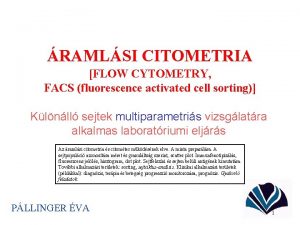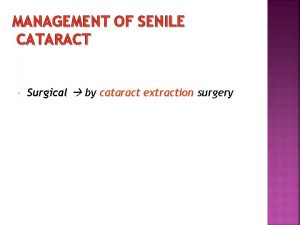Priscilla Arnold MD FACS American Society Of Cataract











- Slides: 11

Priscilla Arnold, MD FACS American Society Of Cataract & Refractive Surgery

Intraoperative Floppy Iris Syndrome A newly described clinical entity

What is IFIS? § This syndrome was identified in 2004, and published in April 2005 (JCRS) by Drs. David Chang and John Campbell § IFIS is especially associated with tamsulosin (Flomax) - the most commonly used drug for BPH, but has been reported to occur with other similar drugs.

Pharmacologic neuropathy § Alpha – 1 blockers are used for BPH (and to treat urinary retention in women) § Tamsulosin is an Alpha – 1 A specific blocker—the identical receptor found in the dilator muscle of the iris § Even short-term use can lead to nonreversable iris dilation dysfunction in some patients

Normal iris features § Pupil dilates widely preoperatively § The iris maintains its integrity throughout the surgical case § Manipulation does not cause loss of dilation

Distinctive IFIS features § Pupil dilates poorly § Surgery begins & pupil constricts more § Flaccid iris billows around instruments & out of incision § Increased difficulty of case & probability of complications

IFIS in action

Pupil expansion devices § Several types of devices can maintain adequate exposure § These add time and cost to the procedure § They must be utilized at the beginning of the surgery

Surgical precautions § Maximal pharmacologic dilation § High-retention viscoelastic § “Slow-motion” procedure § Pupil expansion devices § Most critical – surgeon’s prior knowledge of the condition, in order to prepare adequately for this complex situation

Responses to IFIS § Identification of syndrome § FDA warning label § Joint statement with ASCRS & AUA § Multicenter surgical study § Patient education § Presentation for code

Summary § Newly described, specific entity § Drug-related denervation with resultant abnormal iris function § Significant increased risk of cataract surgery, especially if not known preoperatively by the surgeon § Special planning and devices can usually allow surgery to proceed successfully




















